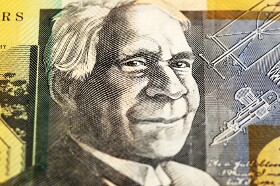
The Australian dollar was among the strongest currencies today. That puzzled market analysts as Australia’s macroeconomic reports were not particularly favorable and the market sentiment was negative to riskier commodity-related currencies due to geopolitical tensions and prospects for additional monetary tightening from the Federal Reserve.
The Australian Bureau of Statistics reported that Australian employers added 5,600 jobs in September, almost three times less than analysts had predicted — 15,200. On a positive note, the increase was the result of gains in full-time employment, while part-time employment decreased.
The unemployment rate unexpectedly fell from 5.3% to 5.0%. But it is important to note that the participation rate also fell, therefore lower unemployment could be just a result of shrinking working force.
Released separately, the business confidence index reported by National Australia Bank fell from +7 to +3 in the third quarter of 2018. The business conditions index inched down from +15 to +13. Yet the report was not entirely bad as Alan Oster, NAB Group Chief Economist, stated:
The latest monthly survey suggests that conditions have stabilised at a still high level. This suggests that momentum in the business sector has not weakened further. Overall, trading conditions, profitability and employment conditions remain quite favourable.
AUD/USD climbed from 0.7108 to 0.7143 as of 11:51 GMT today. EUR/AUD dropped from 1.6173 to 1.6122. AUD/JPY advanced from 80.05 to 80.34.
If you have any questions, comments or opinions regarding the Australian Dollar,
feel free to post them using the commentary form below.